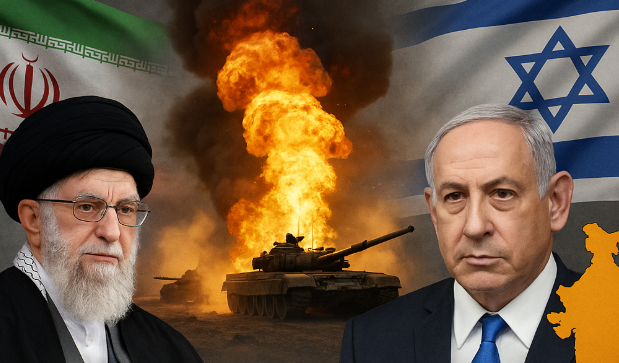
As tensions escalate between Israel and Iran, several questions arise, especially concerning India’s position in this brewing conflict. India maintains friendly relations and substantial trade with both nations, making this conflict more than just a distant geopolitical issue for New Delhi. The implications for India are multi-layered, spanning from trade disruptions to rising energy costs and even challenges for Indian workers in the Middle East.
To understand India's concerns, it is important to first look at its trade relations with both Israel and Iran. With Iran, India traditionally imported a significant amount of crude oil, considering that Iran accounts for around 3% of global crude oil production. India, which imports nearly 85% of its crude oil requirements, had once heavily relied on Iranian oil. However, in recent years, due to international sanctions imposed on Iran, India has significantly reduced its oil imports from the country. Nevertheless, trade between the two nations continues in other sectors. Currently, India engages in approximately $2.2 billion worth of trade with Iran. This includes India exporting basmati rice to Iran, while Iran exports dry fruits, chemicals, and glassware to India.
On the other hand, Israel-India trade stands slightly higher at around $2.4 billion. The nature of trade between India and Israel is quite different compared to that with Iran. Israel is one of India's largest defense equipment suppliers. India imports significant amounts of military hardware from Israel. Conversely, India exports polished diamonds, jewelry, consumer electronics, and engineering goods to Israel. Thus, both countries are important trade partners for India in distinct ways — Iran for its natural resources and Israel for its defense technology and equipment.
At first glance, the direct trade volumes with both countries might not seem extremely large in the context of India's total international trade. However, the larger concern lies in the potential disruption of the Strait of Hormuz — a narrow but vital maritime passage that connects the Persian Gulf with the Arabian Sea. This chokepoint is crucial for India as a major portion of its crude oil imports from UAE, Saudi Arabia, Qatar, Bahrain, and Iraq passes through this route. Any military conflict or instability that affects the Strait of Hormuz could severely hamper India's energy supplies, leading to price hikes and supply shortages.
Additionally, the airspace restrictions resulting from escalating conflict further strain India's connectivity and trade. With Pakistan’s airspace often closed for Indian flights and increasing hostilities over Iranian airspace, Indian flights to Russia, Central Asia, and Afghanistan are facing severe operational challenges. Airlines are forced to reroute flights either through China or take longer paths via the Mediterranean and Turkey, significantly increasing operational costs. This leads to higher airfares, reduced flight availability, and economic losses for airlines and passengers alike.
Another serious consequence for India stems from its large workforce in the Middle East. A substantial number of Indian workers reside and work in Gulf countries. Any destabilization in the region not only threatens their safety but also impacts remittance inflows to India. Remittances from Indian workers abroad form a significant source of foreign exchange earnings for the country. Reduced job opportunities, layoffs, or forced evacuations would have a direct adverse impact on millions of Indian families relying on these income flows.
In conclusion, while India is not directly involved in the Israel-Iran conflict, the consequences of any further escalation could be far-reaching for the country. From oil supply disruptions and soaring energy costs to expensive air routes and shrinking remittances, the conflict carries multi-dimensional risks for India. As the situation unfolds, India will need to carefully balance its diplomatic stance, continue mediatory efforts, and be prepared for possible economic repercussions that might arise from any sustained or expanded hostilities in the Middle East.
Disclaimer:
The information provided in this article is for informational purposes only and reflects the situation based on publicly available sources at the time of writing. Geopolitical conflicts are highly dynamic, and circumstances may change rapidly. The content does not intend to promote or favor any political stance or entity. Readers are advised to conduct their own research and refer to official government updates, verified news sources, and expert analyses for the most current information. The author and the website do not assume any responsibility for decisions made based on this information.




